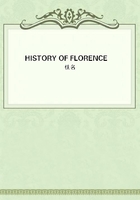
第94章
All this took place during the exile of Cosmo, after whose return, those who had restored him, and a great number of persons injured by the opposite party, resolved at all events to make themselves sure of the government; and the Signory for the months of November and December, not content with what their predecessors had done in favor of their party extended the term and changed the residences of several who were banished, and increased the number of exiles. In addition to these evils, it was observed that citizens were more annoyed on account of their wealth, their family connections or private animosities, than for the sake of the party to which they adhered, so that if these prescriptions had been accompanied with bloodshed, they would have resembled those of Octavius and Sylla, though in reality they were not without some stains; for Antonio di Bernardo Guadagni was beheaded, and four other citizens, among whom were Zanobi dei Belfratelli and Cosmo Barbadori, passing the confines to which they were limited, proceeded to Venice, where the Venetians, valuing the friendship of Cosmo de' Medici more than their own honor, sent them prisoners to him, and they were basely put to death. This circumstance greatly increased the influence of that party, and struck their enemies with terror, finding that such a powerful republic would so humble itself to the Florentines. This, however, was supposed to have been done, not so much out of kindness to Cosmo, as to excite dissensions in Florence, and by means of bloodshed make greater certainty of division among the citizens, for the Venetians knew there was no other obstacle to their ambition so great as the union of her people.
The city being cleared of the enemies, or suspected enemies of the state, those in possession of the government now began to strengthen their party by conferring benefits upon such as were in a condition to serve them, and the family of the Alberti, with all who had been banished by the former government, were recalled. All the nobility, with few exceptions, were reduced to the ranks of the people, and the possessions of the exiles were divided among themselves, upon each paying a small acknowledgment. They then fortified themselves with new laws and provisos, made new Squittini, withdrawing the names of their adversaries from the purses, and filling them with those of their friends. Taking advice from the ruin of their enemies, they considered that to allow the great offices to be filled by mere chance of drawing, did not afford the government sufficient security, they therefore resolved that the magistrates possessing the power of life and death should always be chosen from among the leaders of their own party, and therefore that the /Accoppiatori/, or persons selected for the imborsation of the new Squittini, with the Signory who had to retire from office, should make the new appointments. They gave to eight of the guard authority to proceed capitally, and provided that the exiles, when their term of banishment was complete, should not be allowed to return, unless from the Signory and Colleagues, which were thirty-seven in number, the consent of thirty-four was obtained. It was made unlawful to write to or to receive letters from them; every word, sign, or action that gave offense to the ruling party was punished with the utmost rigor; and if there was still in Florence any suspected person whom these regulations did not reach, he was oppressed with taxes imposed for the occasion. Thus in a short time, having expelled or impoverished the whole of the adverse party, they established themselves firmly in the government. Not to be destitute of external assistance, and to deprive others of it, who might use it against themselves, they entered into a league, offensive and defensive, with the pope, the Venetians, and the duke of Milan.
CHAPTER II
Death of Giovanni II.--Ren?of Anjou and Alfonso of Aragon aspire to the kingdom--Alfonso is routed and taken by the Genoese--Alfonso being a prisoner of the duke of Milan, obtains his friendship--The Genoese disgusted with the duke of Milan--Divisions among the Genoese--The Genoese, by means of Francesco Spinola, expel the duke's governor--League against the duke of Milan--Rinaldo degli Albizzi advises the duke to make war against the Florentines--His discourse to the duke--The duke adopts measures injurious to the Florentines--Niccolo Piccinino appointed to command the duke's forces--Preparations of the Florentines--Piccinino routed before Barga.
The affairs of Florence being in this condition, Giovanna, queen of Naples, died, and by her will appointed Ren?of Anjou to be her successor. Alfonso, king of Aragon, was at this time in Sicily, and having obtained the concurrence of many barons, prepared to take possession of the kingdom. The Neapolitans, with whom a greater number of barons were also associated, favored Ren? The pope was unwilling that either of them should obtain it; but desired the affairs of Naples to be administered by a governor of his own appointing.
In the meantime Alfonso entered the kingdom, and was received by the duke of Sessa; he brought with him some princes, whom he had engaged in his service, with the design (already possessing Capua, which the prince of Taranto held in his name) of subduing the Neapolitans, and sent his fleet to attack Gaeta, which had declared itself in their favor. They therefore demanded assistance of the duke of Milan, who persuaded the Genoese to undertake their defense; and they, to satisfy the duke their sovereign, and protect the merchandise they possessed, both at Naples and Gaeta, armed a powerful fleet. Alfonso hearing of this, augmented his own naval force, went in person to meet the Genoese, and coming up with them near the island of Ponzio, an engagement ensued, in which the Aragonese were defeated, and Alfonso, with many of the princes of his suite, made prisoners, and sent by the Genoese to the Filippo.